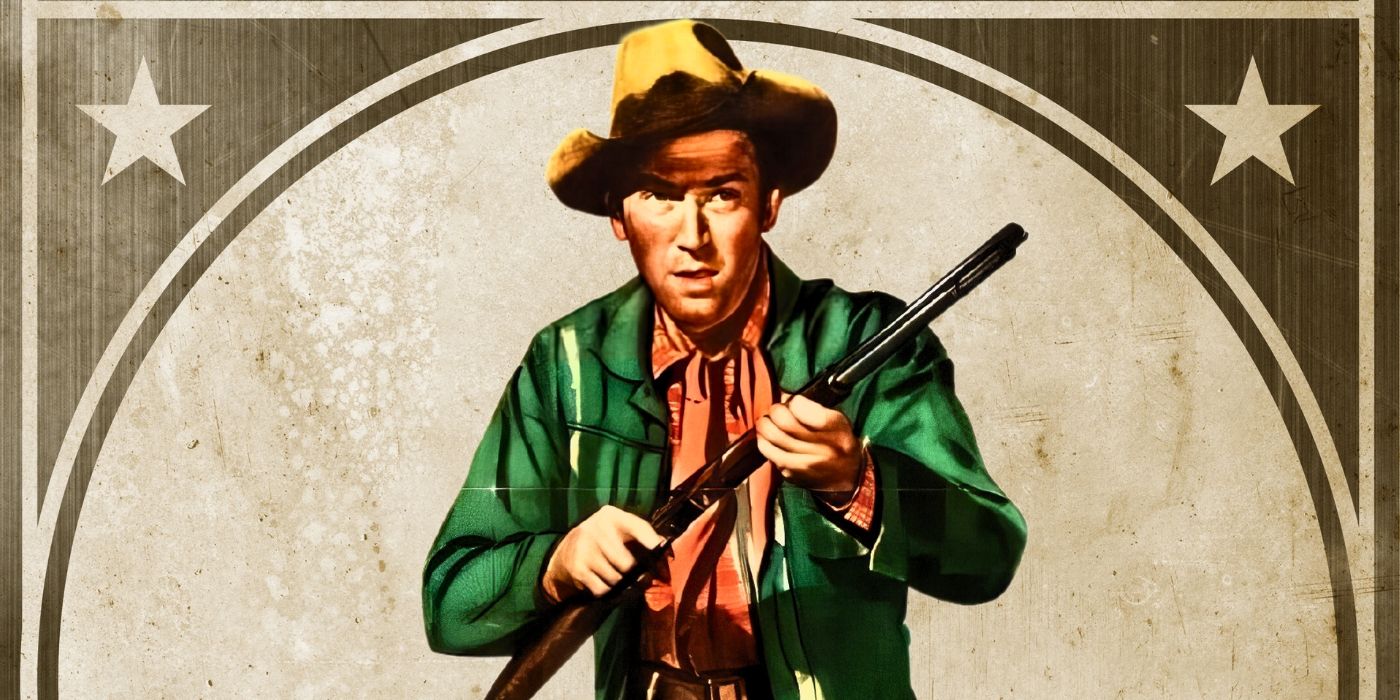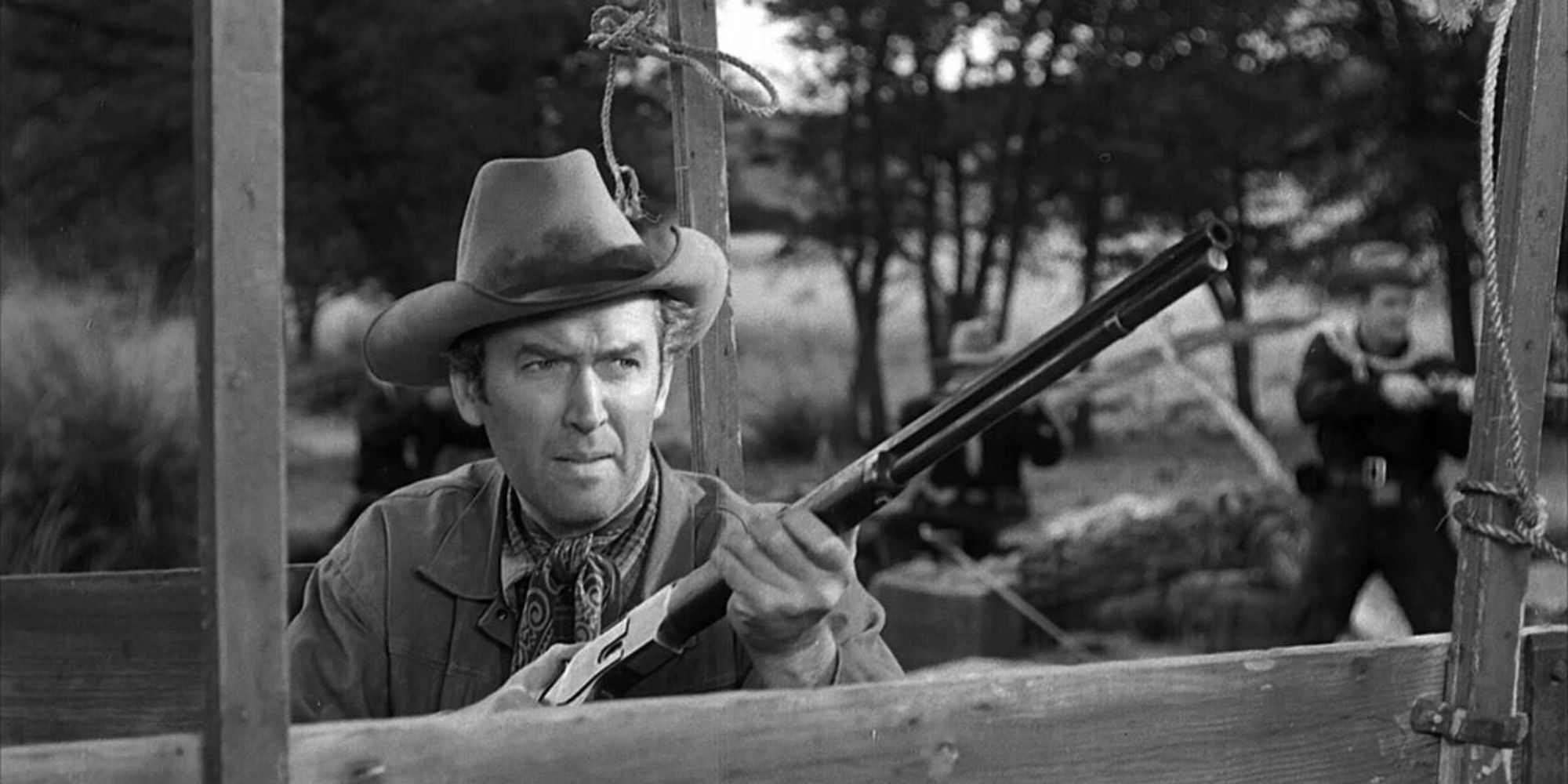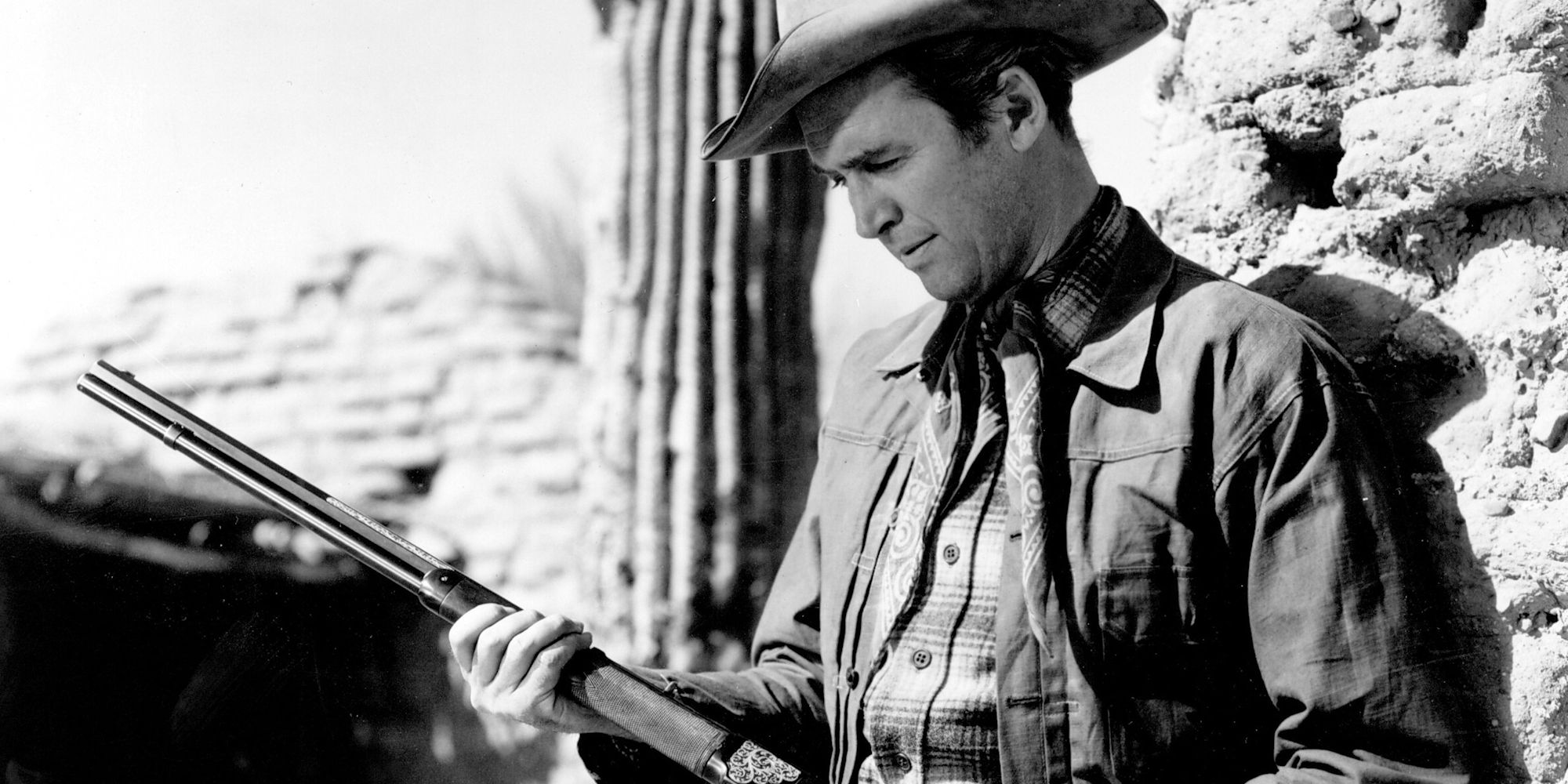In the Golden Age of Hollywood, there was no one more imminently likable and endearing than James Stewart, or Jimmy Stewart as he's more commonly referred to. With his youthful charisma, endearing innocence, and surprisingly astute sense of wisdom, Stewart represented an inherent goodness that was hard to replicate. Between Mr. Smith Goes To Washington, It’s A Wonderful Life, The Philadelphia Story, Destry Rides Again, and You Can’t Take It With You, the 1930s and ‘40s were dominated by Stewart’s most optimistic work. However, his later projects verged into shockingly dark territory, much of which was initiated by the deeply cynical revisionist western Winchester ‘73. The film’s depiction of frontier violence was disturbing enough in its own right, but seeing a face as friendly as Stewart’s in the mix made it even more disturbing.
Jimmy Stewart Took on a Darker Western With 'Winchester '73'
Winchester ‘73 was the first of seven westerns that Stewart starred in for director Anthony Mann, who’s lean and mean approach to the genre differentiated him from the more sweeping style of John Ford. Winchester ‘73 drew inspiration from international auteurs like Fritz Lang with its grittier approach to the ramifications of violence; the film tracks the ownership of a prized weapon between various owners, with Stewart’s character Lin McAdam serving as the anti-hero on its trail. Lin is a morally ambiguous gunslinger who enters a shooting contest to win the weapon, only to have it stolen by an unknown assailant shortly thereafter. Lin and his partner Frankie Wilson (Millard Mitchell) team up to track it down as Mann simultaneously studies all the damage that simply one gun can cause.
Winchester ‘73 wasn’t just Stewart’s first of many masterpieces with Mann, but the film that effectively established his evolution; it came the same year as the similarly dark western Broken Arrow, and directly preceded his work with Alfred Hitchcock on Rear Window, Vertigo, Rope, and The Man Who Knew Too Much. Like many Hollywood stars, Stewart had served in World War II, and even attained the rank of colonel in the Army Air Corps after 0ver 20 combat missions. There was a notable shift in his filmography as a result, and Winchester ‘73 showed a more deeply cynical side to his personality. Lin certainly isn’t the antagonist of Winchester ‘73, but in a film without heroes, that’s not saying a whole lot.
In 'Winchester '73' Jimmy Stewart Is Menacing
Stewart’s initial introduction is downright shocking; while audiences were used to seeing him enter the screen with a buoyant charm, Lin and Frankie enter a seedy saloon in Kansas in order to get revenge on Dutch Henry Brown (Stephen McNally), a criminal with whom they have a “score to settle.” Stewart is clearly ready to spring into violence at any moment, and it’s only the appearance of several federal justice officers that prevent him from lashing out at Dutch in public. There’s nothing to suggest that Lin’s skills are anything but lethal, and somehow seeing him forced to hold back from violence was even more disturbing than a barrage of gunfire. It signified a noticeable shift away from the more crowd pleasing nature of earlier westerns, and perfectly laid the groundwork for a new era.
As a result, Lin’s excellent marksmanship within the initial shooting contest was the perfect way to tease his talent in combat without a direct encounter with Dutch; there’s a level-headed precision to the effectiveness of Lin’s marksmanship that signifies he has been in many battles before. It’s evident that the other characters fear him, including Dutch. Dutch’s decision to steal the rifle insteading of challenging Lin to a fair contest only incentivizes Stewart to show Lin’s restrained nature. It’s the perfect way to tease the eventual shootout that will occur towards the end of the film; it’s easy to see why Quentin Tarantino is among its biggest fans.
Although the basic story structure of a stolen prize and a mission of vengeance isn’t necessarily anything new for the western genre, Mann’s more experimental way of tracking the gun from owner to owner makes the middle section of the film more interesting. After seeing the various villains, outlaws, and bandits that exist in Mann’s gritty version of the west, Lin’s violent nature is at least more understandable; for better or worse, he’s the closest thing to a “hero” as the film is going to get. Stewart is able to bring a subdued gravity that never verges into caricature like John Wayne, yet feels more tragic than the no-nonsense coolness that Clint Eastwood and the western stars of the “spaghetti” era had.
'Winchester '7s's Story Is Riveting
There’s a secluded nature to Stewart’s performance that he rarely showed in any of his previous roles. The details shared about Lin’s backstory inform his current trajectory, even if they don’t necessarily absolve him of his crimes or completely spell out what experiences he had. The eventual twist that Lin and Dutch are brothers, and that their “score to settle” was a botched robbery in which Dutch shot Lin in the back, elevates a simple revenge mission into a somewhat Shakespearean familial conflict. However, Lin’s expertise in escaping from Native American pursuers and his knowledge of military tactics suggest a more checkered backstory that is left to the viewers’ imagination.
Nonetheless, it’s the rivalry between the brothers that makes the finale of Winchester ‘73 so electrifying; the emotion of the scene really shines through thanks to the excellent chemistry between Stewart and McNally, and keeping them separate for so long only intensifies their standoff. There are years of history between them that can be seen in their eyes, and while Dutch’s betrayal may have been the inciting conflict, there are certainly more reasons that these brothers have to hate each other. The final gun battle lacks the operatic nature of the final conflicts in High Noon or The Good, The Bad, and the Ugly; Lin dispatches his brother with efficiency, earning back his prized rifle and finding peace to the betrayal he wasn’t able to forget.
There’s a quiet sense of reservation on Jimmy Stewart’s face following the battle; what do you do when you’ve reached your lifelong goal? It’s left unclear if Lin will choose a more honorable route in the future, or if he’s been so chilled by his experience that he’s forever tied to this seedy side of the west. It’s a haunting role for one of cinema’s friendliest faces.



